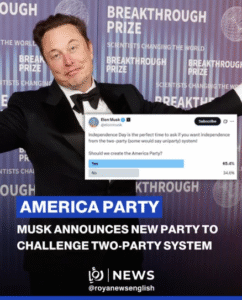Elon Musk has announced the formation of a new political entity called the “America Party,” aiming to challenge the dominance of the traditional two-party system in the United States. The move was revealed on Independence Day through Musk’s platform X, where he emphasized the party’s mission to “give back freedom” to Americans and offer an alternative to what he called a “uniparty system” led by Republicans and Democrats.
The announcement follows a public poll Musk posted, which reportedly received over a million responses, with a majority supporting the idea of breaking away from the current political structure. Musk said the America Party would begin by fielding candidates in select Senate and House races in the 2026 midterms, aiming to form a small but influential bloc that could sway legislation and challenge entrenched interests.
Musk’s pivot to formal political action comes amid a public rift with Donald Trump, whom he previously supported financially. Musk criticized a sweeping spending bill backed by Trump as fiscally irresponsible and labeled it a betrayal of conservative values. He warned that if the bill passed, it would prompt the launch of his new political party—a threat he has now acted on.
While some see the America Party as a genuine attempt to reform U.S. politics, critics argue it may be more of a pressure tactic or vanity project. Legal experts note the significant challenges Musk faces, including ballot access laws, organizing infrastructure, and persuading voters in a system historically unkind to third parties. Nonetheless, early polls suggest that a significant number of Americans are open to alternatives, especially among independents and younger voters.
Musk’s announcement has sparked a mix of support and skepticism. While some hail it as a bold step toward political innovation, others—including allies of Trump—have dismissed it as unrealistic or attention-seeking. Whether the America Party will become a lasting force in American politics or simply a fleeting experiment remains to be seen.


